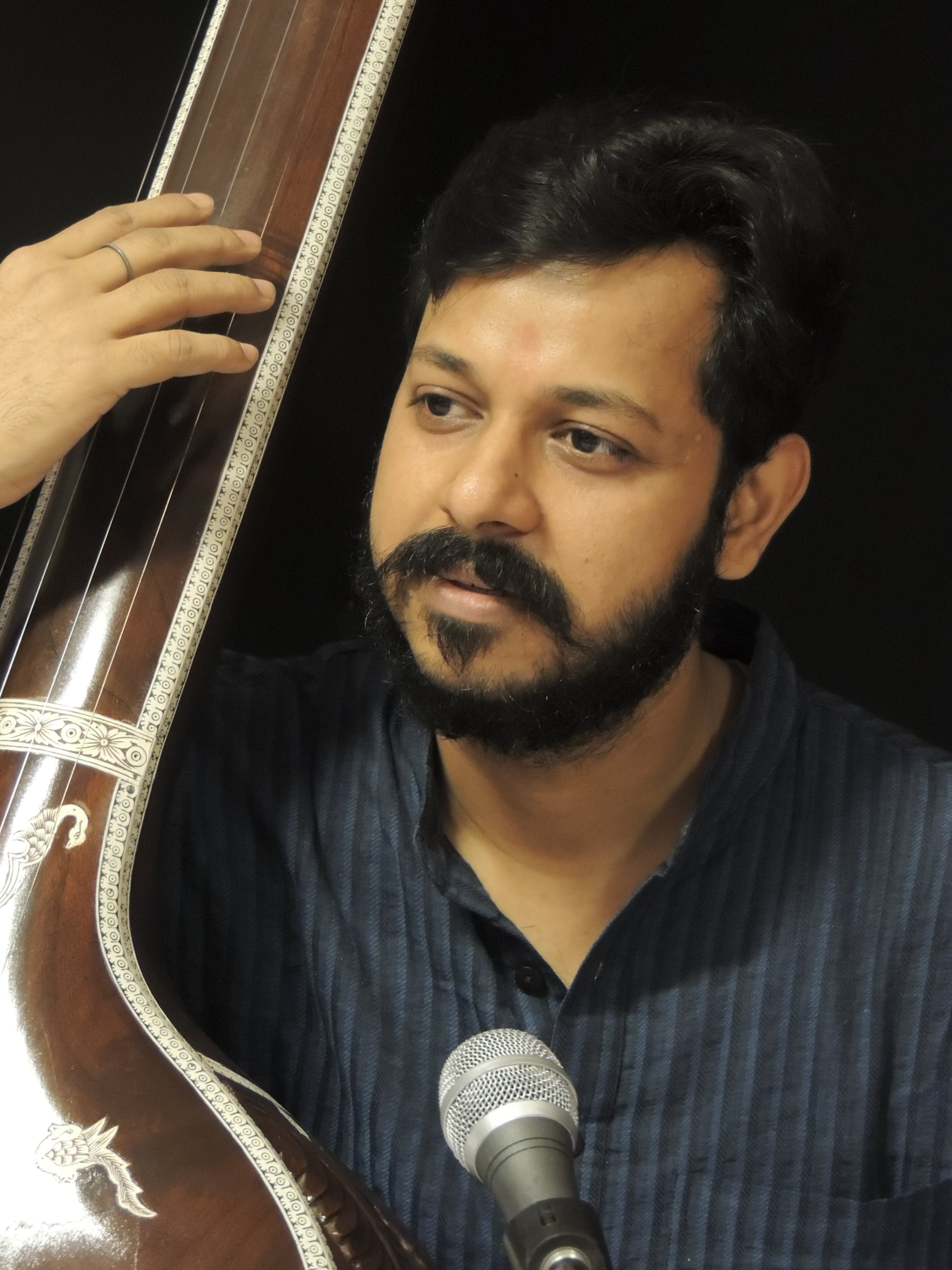Sumeet Anand Pandey brings Dhrupad music, Indian traditions to UCLA
Sumeet Anand Pandey extends his hand outward while gazing slightly upward during a performance. Anand Pandey is a traditional Dhrupad vocalist and musician who was raised in Patna, India, and will be at UCLA until March as a Fulbright Professional Fellow. (Courtesy of Hajdu János/House of Music)
“Sumeet Anand in Concert”
Oct. 20
Lani Hall
4 p.m.
By Reid Sperisen
Oct. 16, 2024 1:15 p.m.
This post was updated Oct. 17 at 7:49 p.m.
The rich history of Dhrupad music is coming to UCLA this fall, starting with a performance this weekend.
Traditional Dhrupad vocalist Sumeet Anand Pandey will perform at UCLA’s Lani Hall on Sunday for his first concert in the United States. Dhrupad is the oldest surviving genre of Hindustani classical music, and Pandey belongs to the Darbhanga Dhrupad vocalist tradition originating from the North Bihar region of India. Pandey will be at UCLA for both fall and winter quarters as a Fulbright Professional Fellow, with several workshops and a winter class to teach students about the history and vocal approach of Dhrupad music.
“I would like to bust a couple of myths here, or maybe challenge them,” Pandey said. “Just to present a counterpoint about enjoying Indian classical music, or classical music for that matter.”
Pandey said his exposure to music began when he was born, as both of his grandfathers – his paternal grandfather Shri Birendra Mohan Pandey and his maternal grandfather Pandit Siyaram Tiwari – were professional Dhrupad musicians. He said he did not realize until later in life the breadth of knowledge he had been exposed to by training as a child in Dhrupad music with his grandfathers. Pandey said he relocated from Patna to Delhi to attend university with the intention of pursuing a conventional career in management instead of music.
[Related: Hasitha Guhan combines individuality, authenticity in newly released EP]
It was after being exposed to a variety of genres of music while living in Delhi – India’s capital city – that Pandey said he reopened himself to music. He said he listened to a range of music while also revisiting his grandfathers’ recordings in the early 2000s, inspiring him to become a disciple of Pandit Abhay Narayan Mallick of the Darbhanga-Mallick family tradition of Dhrupad music. After 15 years in a Guru-Shishya Parampara, or Master-Disciple Tradition, prior to his mentor’s death, Pandey said he realized that his future as a professional musician has become a commitment for life despite the unpredictability of his chosen career path.
“I just followed my heart, and I jumped without thinking much,” Pandey said. “I’m thoroughly enjoying this journey. I’m very grateful that this happened to me.”

Ethnomusicology professor Anna Morcom said she met Pandey through her research and that they have stayed in touch for several years prior to his arrival at UCLA. Most Indian classical musicians maintain success well into their 50s or 60s because of the length of time it takes to master the complexity of the genre, Morcom said, but she is interested in the different perspective Pandey offers as a younger artist.
“If you’re a young musician, it’s hard to be taken seriously because it’s considered such a big, profound, deep kind of music,” Morcom said. “I’m really interested to see a new generation of musicians coming up, and he’s one of them.”
Eileen Strempel is the inaugural dean of UCLA’s Herb Alpert School of Music, a position she has held since 2019. She said Pandey’s upcoming performance and involvement at UCLA through his Fulbright fellowship embodies the goals of the School of Music to meld scholarship with the diverse communities of UCLA and Los Angeles more broadly. She said the intersection of musical practice and scholarship is crucial to celebrating LA’s cultural vibrancy, global traditions and expatriate communities while extending the reach of UCLA as a global university.
“I’m always honored and humbled really to support programs that really bring our mission and vision to life as a new school,” Strempel said. “Our mission starts out esteeming all musical traditions as vital cultural expressions of our evolving global society.”
[Related: UCLA alumnus Danish Renzu uplifts Kashmiri narratives through record label]
There are multiple genres of Hindustani classical music found in northern India – including Khyal and Dhrupad – and Pandey belongs to the latter, Morcom said. She said Khyal classical music is marked by drum patterns and a rhythmic cycle that allows a vocalist to know where they are in the composition as they improvise often and experiment with vocal gymnastics. By comparison, she said Dhrupad classical music is less improvisational and can be more difficult to execute without the same drum cycle or rhythmic elements, though portions can still be fast and exciting.
Morcom said she is excited to support Pandey and the new generation of Hindustani classical musicians he represents. She said she loves all forms of Hindustani music and hopes to educate audiences more broadly about the diversity of Indian music and culture, which stretches across over 20 languages, as well as various ethnicities, religions, socioeconomic classes and regions. Dhrupad music is an important part of this educational process, and the richness of the music can evoke emotions that are beautiful and meditative, she added.
Pandey said his performance will include elements of Chhanda-prabandha, which is a tradition of Vedic chanting dating back to the 12th and 13th centuries. He said the performance will be accompanied by instruments such as the pakhawaj – a type of drum – as well as a four-stringed instrument called the tanpura. Dhrupad music was once performed for Indian royalty with themes about gods and goddesses but has evolved to encompass philosophy, human values and a connection with yoga as its accessibility has increased, Pandey said. Without populist leanings, though, Dhrupad music remains more complex in pursuit of enlightenment and self-realization, he added.
“This music is not plain entertainment,” Pandey said. “This goes beyond.”
